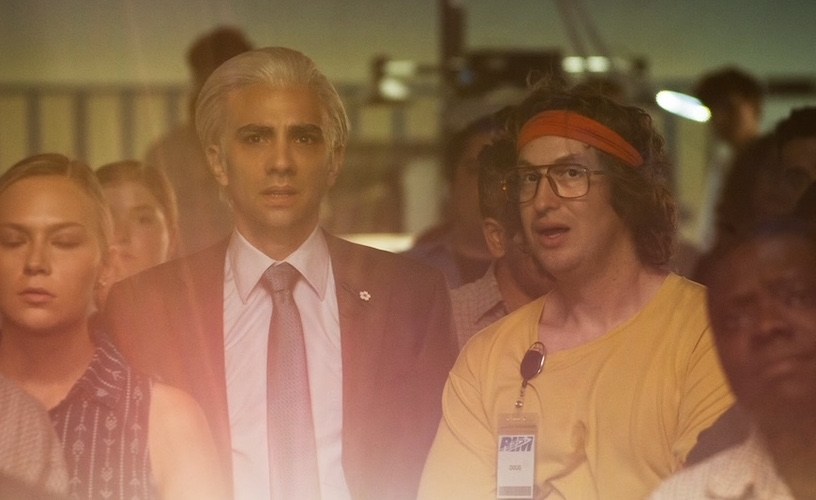The Rise and Fall of Your First Smartphone

A 60 Minutes clip from 1999 circulates around the internet every so often, in which the late Bob Simon rhetorically asks, “A couple of geeks who sketched out some software … could destroy Sears Roebuck?” He was referring to Amazon, which in the years since became, of course, not only a multinational behemoth but a prototypical success story of 1990s-tech-optimism.
Not every company of that era was so successful. Some look a lot more like Sears today.
The movie BlackBerry tells one of those less fortunate stories, about the titular smartphone that went from dominance to obsolescence in the blink of an eye. In 2002, the New York Times reported that the BlackBerry—named for its fruit-like keyboard—helped raise its company’s annual revenue from $8.7 million to $294.1 million in half a decade. But in even less time, the phone went dramatically out of style: BlackBerry’s market share dropped from 43 percent in 2010 to roughly 6 percent in 2013.
Its market share today? Zero.
But BlackBerry hardly feels like a straightforward cautionary tale, and that’s one of its biggest strengths. What could have been a repetitive exercise in politicizing or moralizing the rise and fall (financial or personal) of a corporate giant turns out instead to be an impressive entry into the biographical dramedy genre: fun, smart, and interesting along the way.
The movie focuses on the business dynamic between Mike Lazaridis (Jay Baruchel) and Jim Balsillie (Glenn Howerton), the former co-CEOs of Research in Motion (RIM). The company developed modems, pagers, and eventually the BlackBerry throughout the 1990s and 2000s, before Steve Jobs and Apple showed us we actually never wanted smartphones with physical keyboards in the first place. But back in 1996, when the film begins, the smartphone revolution was nascent and we were all barely figuring out how to text with our thumbs.
Mike runs RIM with his buddy Doug Fregin (played by Matt Johnson, who also co-wrote and directed the film) in Waterloo, Ontario, out of an office that looks more like a college lounge for computer science majors than a functioning workplace. Jim, meanwhile, is a stern business executive, freshly laid off for undermining his boss during a client presentation. But he wastes no time making his next moves. Jim meets with Mike and proposes a deal: Jim’s business acumen and connections in exchange for being made co-CEO of RIM. Mike agrees, much to Doug’s dismay, who is suspicious of Jim from the start. But things soon take off, and within the span of a few years RIM goes from being an unknown scrappy shop to a tech powerhouse having to fend off a potential acquisition by Palm (another relic of the smartphone past).
There are obvious comparisons to draw between BlackBerry and other biz-tech boom-and-bust dramatizations. From music-layed montages, to an onscreen written epilogue, to the inevitable moment when partners cross each other, the movie relishes in the genre and doesn’t try to reinvent it.
Lesser depictions of the corporate world simply try too hard to be masterpieces, and in the process become predictably preachy. BlackBerry has more modest goals, but it also avoids the moralism of an exposé about the inherent flaws of capitalism, or the cynicism of an introspective look at the soul of a person corrupted by ambition. Mike and Jim aren’t angels, but they also aren’t vehicles for a broader societal critique—they’re not another Gordon Gekko or Logan Roy.
Even more to its credit, BlackBerry has a certain self-awareness that eludes even its best counterparts in the genre. Something like David Fincher’s excellent Facebook origin story The Social Network (2010), for example, suffers from overconfidence in the future relevance of its subject. One can’t help but watch that film now and feel a bit silly in retrospect at how edgy the site was portrayed, given how conventional it feels today (sorry, millennials).
We’re in a completely different starting point in relation to BlackBerry, and Johnson uses that knowledge to the movie’s advantage. Even as we see Mike and Jim dazzle business executives with tales of a product that will be the way of the future, we know that the sounds of a BlackBerry’s keyboard clicking away eventually disappeared from airport lounges and conference rooms across the country. BlackBerry is smart enough to realize that what feels earth-shattering today could be relegated to oblivion tomorrow—and explores this less as a tragic possibility than as an entertaining truth.